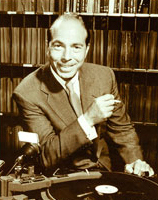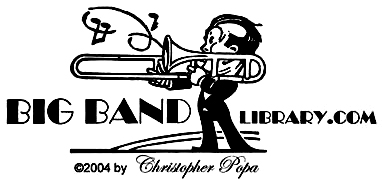
Disc Jockeys and Announcers:
MARTIN BLOCK
by Christopher Popa
October 2005
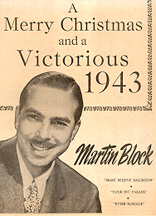
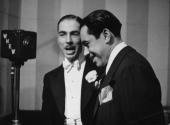
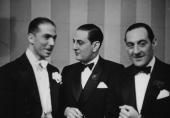
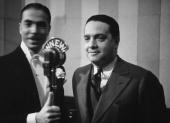
sources:
Hinckley, David. "Future of radio,"
New York Daily News /
newyorkdailynews.com, Mar. 17, 2004.
"Radio Broadcasting History,"
440.com/namesb1.html.
Radio Hall of Fame, radiohof.org.
Social Security Death Index.
send feedback about "Disc Jockeys and Announcers: Martin Block" via e-mail
return to Big Band Library homepage
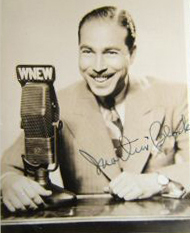
He suggested an idea to the New York City radio station where he worked, and it led to him becoming a star.
WNEW was carrying periodic bulletins from the trial of Bruno Richard Hauptmann, who was charged with the kidnapping and murder of Charles Lindbergh's infant son. To fill the air time between reports, Martin Block, a part-time announcer, proposed to play records. On February 3, 1935, WNEW gave him the go-ahead, to create a "make believe ballroom" on the radio.
Supposedly, WNEW didn't yet have any records, so, as a start, Block went to the Liberty Music Shop and purchased five Clyde McCoy discs. McCoy's Sugar Blues became the program's first theme.
vital stats:
given name Martin Block
birth Feb. 3, 1903
death Sept. 18, 1967
previous employment sales (sold razor blades and potato peelers off the back of a truck)
stations incl. Tijuana, Mexico; KFWB, Los Angeles,
1932; WNEW, New York City, 1934; KSWB, Los
Angeles, 1946; WOR, New York City, 1965
son Joel, who runs an audio production business in
Texas
In playing the records, Block used an intimate, personal style (rather than a disembodied voice of authority as others employed).
In 1936, the theme of his program became
Make-Believe Ballroom, which was recorded by Charlie Barnet and His Orchestra. Four years later, Glenn Miller's band, with the Modernaires' vocal, recorded a new version of the song, titled Make Believe Ballroom Time, and Block adopted it.
By then, his program was being heard by 25% of the radio audience, and began to be offered in national syndication.
It was said that by the end of World War II, Block was earning $22,000 weekly, compared to his initial salary at WNEW of $25 a week.
While announcing commercials for sponsors, he was credited with coming up with two of the most popular slogans ever: "ABC: Always Buy Chesterfield" and "LS/MFT" (Lucky Strike Means Fine Tobacco).
In 1988, Block was posthumously inducted into the National Radio Hall of Fame, sponsored by the Museum of Broadcast Communications in Chicago.
Martin Block hosts the big band leaders live, including Guy Lombardo and his brother, Carmen [ top ]; Vincent Lopez [ middle ], and Cab Calloway [ bottom ],
1939.
